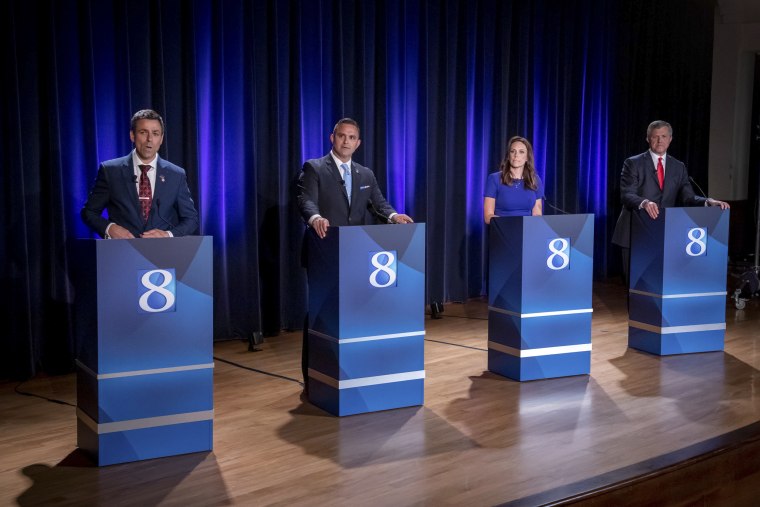[ad_1]
GRAND RAPIDS, Mich. — Tudor Dixon has won Michigan’s Republican nomination for governor, NBC News projects, emerging from one of the year’s most turbulent primaries in a state where the general election will have major implications for the next presidential race.
The former conservative media personality, who secured an endorsement last week from former President Donald Trump, will face Democratic Gov. Gretchen Whitmer, who was renominated without opposition Tuesday.
Early results placed Dixon ahead of four rivals, including chiropractor Garrett Soldano; Kevin Rinke, a former Detroit-area car dealer who loaned $10 million to his campaign; and Ryan Kelley, a real estate broker and right-wing activist who was briefly a front-runner after his arrest on misdemeanor charges of being involved in the insurrection at the U.S. Capitol on Jan. 6, 2021.
Dixon, addressing supporters at a downtown Grand Rapids hotel, took sharp aim at Whitmer. She repeatedly criticized the governor’s lockdown orders during the early days of Covid while pressing her own “family-friendly” agenda.
“Now we have the opportunity to truly hold Gretchen Whitmer accountable for the pain she’s inflicted on each and every one of us during the past four years,” Dixon said.
In an emailed statement after the race was called, Whitmer campaign spokesperson Maeve Coyle said that Dixon “will drag Michigan backwards.”
“While Dixon has focused her campaign on attracting support from special interests and political insiders, Gov. Whitmer has been working to earn support from Michiganders by doing what she has always done: working with anyone to get things done,” Coyle added.
Dixon’s win is in part a testament to the power of the DeVos family, kingmakers in Michigan politics who endorsed her and helped bankroll an aligned super PAC. And her victory gives Trump another ally within striking distance of a governorship and the authority to certify election results.
Trump continues to falsely claim that a second term was stolen from him in 2020 and is teasing another run in 2024. At debates, Dixon answered affirmatively when asked if she believed Trump won Michigan, which went narrowly to President Joe Biden. She also has embraced disproven theories that fraud and untoward efforts by Democratic officeholders tipped the election to Biden.
But Dixon’s rhetoric has been less consistent and less forceful than claims echoed by other Trump allies in Michigan and across the country. In the closing days of the race, her opponents questioned her loyalty to the former president, seizing on a “Fox News Sunday” interview in which Dixon dodged when asked if she believed the 2020 election was stolen.
After casting her ballot Tuesday morning near her home in western Michigan, Dixon similarly sidestepped a reporter’s request to clarify her position.
“You know what? Today I think that’s not an appropriate question,” Dixon replied, adding that she was focused on her own election. “We’ve answered that quite a few times.”
Dixon thanked each of her opponents by name Tuesday night.
“I want to thank them,” she said, “for giving themselves in this effort to better this state.”
Dixon can count on national buy-in for her bid to unseat Whitmer. The Republican Governors Association, which has warily approached other GOP candidates this year, quickly congratulated her.
“We couldn’t be more excited to support Tudor Dixon this fall to end Whitmer’s disastrous tenure,” the group’s co-chairs, Govs. Doug Ducey of Arizona and Pete Ricketts of Nebraska, said in an emailed statement.
In a year when messy GOP primaries have hardly been unusual, Michigan’s offered more chaos than most — a crowded field of election deniers, wealthy businesspeople throwing their money around, a scandal over petition signatures, a candidate arrested on Jan. 6 charges (Kelley has pleaded not guilty), a seven-figure advertising effort by national Democrats to slow Dixon’s momentum and a late Trump endorsement that split the party.

Dixon appeared to be on track to clinch the nomination even before Trump weighed in. After entering the race as an unknown political quantity with low poll numbers and little cash, she capitalized on the missteps of better-positioned rivals.
Her opponents — even before, but especially after, her evasive Fox News interview — had argued that the DeVos endorsement would make Dixon beholden to the establishment and, in the case of former Education Secretary Betsy DeVos, to a Trump turncoat who resigned from his Cabinet after blaming him for the deadly violence on Jan. 6. The DeVos-funded super PAC gave Dixon air cover, spending more than $2.5 million on ads, according to the ad-tracking firm AdImpact. Dixon spent only $118,000.
Rinke put more than $1 million behind advertising that tied Dixon to DeVos and other GOP figures portrayed as RINOs, or Republicans in name only. Soldano, who built a devoted grassroots following by protesting Whitmer’s Covid policies, routinely attacked Dixon’s establishment patrons at debates.
The GOP infighting and nastiness could fester into the fall. Soldano, in an interview Sunday with NBC News after a campaign event in Warren, said he would support Dixon if she won the primary but would do little to activate his fervent supporters for anyone other than himself.
“It’s definitely fractured right now,” Soldano said of the party.
Despite efforts to frame her as an insufficiently conservative instrument of the establishment, Dixon projects a hard-line stance against abortion that Democrats have seized on to paint her as an extremist. (Dixon favors exceptions only when the mother’s life is at risk.) She favors phasing out the state’s personal income tax and talks frequently about “parents’ rights” in education — a front of the culture wars embraced by GOP candidates nationwide amid battles over the propriety of teaching students about racism and sexual orientation. She also has attacked the use of gender-neutral language as part of a “war on women.”
Dixon, Trump told listeners of a brief telephone “rally” he hosted for her Monday night, has “been on the front lines of the battle against left-wing indoctrination of our children.”
In a statement, Lavora Barnes, the chair of the Michigan Democratic Party, vowed to “continue to hold Dixon accountable for her disastrous plans and baseless conspiracy theories.”
Few would have predicted Dixon’s rise. Before getting into conservative media, she had worked as an actor on several low-budget films and for her family’s steel company.
Whitmer, a rising national star and frequent object of Trump’s ire, figured to draw a marquee opponent. Prospects with far more familiar names, including two-time Senate candidate John James and Republican National Committee Chair Ronna McDaniel, were floated as possibilities but stayed out of the race. The GOP establishment, seeing no breakout star among Dixon and the other declared candidates, responded with enthusiasm when James Craig retired as Detroit’s police chief to launch a run last year.
Dixon had a few things going for her, though. She had hosted programs on Real America’s Voice, the network that also carries former Trump adviser Steve Bannon’s right-wing talk show, and made friends within the former president’s orbit. But it wasn’t until other campaigns imploded that her fortunes began to improve. Craig and another top candidate, self-funding businessman Perry Johnson, were disqualified for submitting allegedly fraudulent petition signatures.
Around that time, the DeVoses made known their preference for Dixon. Eventually, the ads placed by the super PAC they sponsored soon began to take root, springing Dixon into the lead in polls.
“I am tough, my friends,” Dixon said as she wrapped her victory speech Tuesday night. “And I am just getting going.”
[ad_2]
Source link




More Stories
News Breakdowns for Easy Understanding
Latest News Headlines Shaping the World
News Insights for a Deeper Perspective